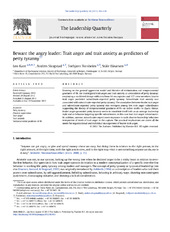| dc.contributor.author | Kant, Leo | |
| dc.contributor.author | Skogstad, Anders | |
| dc.contributor.author | Torsheim, Torbjørn | |
| dc.contributor.author | Einarsen, Ståle | |
| dc.date.accessioned | 2014-02-19T13:25:46Z | |
| dc.date.available | 2014-02-19T13:25:46Z | |
| dc.date.issued | 2013 | eng |
| dc.identifier.uri | https://hdl.handle.net/1956/7801 | |
| dc.description.abstract | Drawing on the general aggression model and theories of victimization and temperamental goodness-of-fit, we investigated trait anger and trait anxiety as antecedents of petty tyranny: employing a multilevel design with data from 84 sea captains and 177 crew members. Leader trait anger predicted subordinate-reported petty tyranny. Subordinate trait anxiety was associated with subordinate-reported petty tyranny. Theassociation between leader traitanger and subordinate-reported petty tyranny was strongest among low trait anger subordinates supporting the theory of temperamental goodness-of-fit — or rather misfit — in dyads. Hence, leader anger-generated petty tyranny seems to constitute itself both as an average leadership style and as behavior targeting specific subordinates, in this case low trait anger subordinates. In addition, anxious subordinates report more exposure to such abusive leadership behaviors irrespective of levels of trait anger in the captain. The practical implications are above all the needs for organizational and individual management of leader trait anger. | en_US |
| dc.language.iso | eng | eng |
| dc.publisher | Elsevier | eng |
| dc.rights | Attribution CC BY | eng |
| dc.rights.uri | http://creativecommons.org/licenses/by/3.0/ | eng |
| dc.subject | Petty tyranny | eng |
| dc.subject | Abusive supervision | eng |
| dc.subject | Trait anger | eng |
| dc.subject | Trait anxiety | eng |
| dc.subject | Temperamental goodness-of-fit | eng |
| dc.title | Beware the angry leader: Trait anger and trait anxiety as predictors of petty tyranny | eng |
| dc.type | Peer reviewed | |
| dc.type | Journal article | |
| dc.description.version | publishedVersion | |
| dc.rights.holder | Copyright 2012 The Authors. | |
| dc.identifier.doi | https://doi.org/10.1016/j.leaqua.2012.08.005 | |
| dc.identifier.cristin | 1010961 | |
| dc.source.journal | The Leadership Quarterly | |
| dc.source.40 | 24 | |
| dc.source.14 | 1 | |
| dc.source.pagenumber | 106-124 | |

